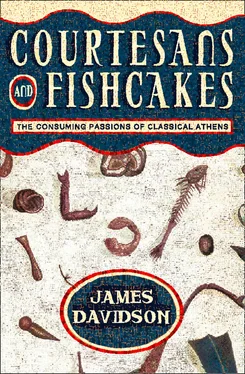THE ORATOR APOLLODORUS is attacking Neaera, a prostitute, in court. He digresses, for a moment, on the uses of women in Athens: ‘Hetaeras we keep for pleasure, concubines for attending day-by-day to the body and wives for producing heirs, and for standing trusty guard on our household property.’ 1 Конец ознакомительного фрагмента. Текст предоставлен ООО «ЛитРес». Прочитайте эту книгу целиком, купив полную легальную версию на ЛитРес. Безопасно оплатить книгу можно банковской картой Visa, MasterCard, Maestro, со счета мобильного телефона, с платежного терминала, в салоне МТС или Связной, через PayPal, WebMoney, Яндекс.Деньги, QIWI Кошелек, бонусными картами или другим удобным Вам способом.
Ancient literature contains no shortage of attempts by ancient men to put ancient women in their proper sexual place, and a whole lexicon of labels and terms with which to do it: ‘two-obol woman’, ‘ground-beater’, ‘flute-girl’, ‘companion’, ‘wage-earner’, ‘wanderer’, ‘wife’. The very act of naming was an important part of policing women and women’s sexuality. According to the laws of Syracuse, for instance, the great Greek city on the southern tip of Sicily, a woman was forbidden from wearing ‘gold ornaments or gaily-coloured dresses or garments with purple borders unless she admitted she was a common prostitute’. 2 Конец ознакомительного фрагмента. Текст предоставлен ООО «ЛитРес». Прочитайте эту книгу целиком, купив полную легальную версию на ЛитРес. Безопасно оплатить книгу можно банковской картой Visa, MasterCard, Maestro, со счета мобильного телефона, с платежного терминала, в салоне МТС или Связной, через PayPal, WebMoney, Яндекс.Деньги, QIWI Кошелек, бонусными картами или другим удобным Вам способом.
Apollodorus’ neat three-kinds-of-women statement has been particularly influential among modern historians and is sometimes cited as a straightforward account of female roles in Athens. It is far from that, however. The speaker himself shows a remarkable level of inconsistency in conferring his titles on Neaera and the whole thrust of the speech is that such distinctions are easily flouted, enabling Neaera’s daughter, ‘a common whore’ (pornē), to infiltrate the ranks of decent citizens by marrying the King Archon, even presiding with him over the most ancient rites in the city’s religious calendar and risking the wrath of the gods. As the great French classicist Jean-Pierre Vernant comments, the author’s ‘remarks in this … speech indicate better than anything both the desire to establish a clear demarcation … and at the same time the impossibility of so doing’. 3 Конец ознакомительного фрагмента. Текст предоставлен ООО «ЛитРес». Прочитайте эту книгу целиком, купив полную легальную версию на ЛитРес. Безопасно оплатить книгу можно банковской картой Visa, MasterCard, Maestro, со счета мобильного телефона, с платежного терминала, в салоне МТС или Связной, через PayPal, WebMoney, Яндекс.Деньги, QIWI Кошелек, бонусными картами или другим удобным Вам способом.
Other writers are no more helpful than Apollodorus, frequently applying several different terms to the same woman, and thus confounding their own taxonomies. This ambivalence is at the very heart of the vocabulary used to describe women’s roles. Gunē , wife, can also mean more generally ‘woman’ (cf. French femme ), and was sometimes used for a concubine or mistress. The more normal word for a woman in that kind of informal relationship was hetaera, but that could equally well designate a woman of independent means and high fees, or, at the other end of the scale, a slave-girl working for a madam. It is hardly surprising, then, that despite the survival of numerous ancient definitions, attempts to establish clear demarcations between the different categories of women in Athens (to distinguish wives from concubines [ pallakai ] and concubines from ‘courtesans’ and ‘courtesans’ from ‘common whores’ [ pornai ]) are highly problematic, and consensus rarely survives for more than a generation. Most recently, many scholars have become impatient with this inconsistency on the part of ancient writers. Ignoring Vernant’s advice they have concluded that one division alone can be made with some confidence, one division that really mattered: the division between Wives and the Rest. The other distinctions represent nothing more substantial than a rich vocabulary with which men could express varying degrees of contempt for the women they used.
This ‘two-types’ model in works on women in antiquity has had a devastating effect on the career of the courtesan or hetaera who has moved from a position at centre-stage in earlier accounts of prostitution to near invisibility in more recent ones. In the early years of this century, when such subjects as Women and Sex were first considered worthy of attention, the hetaera exercised a strong fascination on male historians. She was represented as a sophisticated lady, a cultured woman of the world, witty, philosophical and flirtatious. In these earlier, idealized treatments a strong distinction was made between high-class courtesans and the pornai , the lower-class prostitutes of the brothels and the streets, who alone represented the ‘bad’ kind of prostitution. Charles Seltman, for instance, writing in the 1950s, maintained:
The framework of social life in Athens was not far different from that of Paris up to 1939. There were brothels, mainly for foreigners of all sorts, licensed under the laws of Solon as far back as the early sixth century BC. The licensing was done to prevent brawling in the streets. Later street-walkers living under the care of a ‘Madame’ began to appear. All this, of course, is the same as in any Mediterranean city today, a world-wide misfortune. But hetaeras were certainly in a very different class; often highly educated women, foreigners from other Greek states and cities, earning a living sometimes in commerce, business girls, bachelor girls, models. 4 Конец ознакомительного фрагмента. Текст предоставлен ООО «ЛитРес». Прочитайте эту книгу целиком, купив полную легальную версию на ЛитРес. Безопасно оплатить книгу можно банковской картой Visa, MasterCard, Maestro, со счета мобильного телефона, с платежного терминала, в салоне МТС или Связной, через PayPal, WebMoney, Яндекс.Деньги, QIWI Кошелек, бонусными картами или другим удобным Вам способом.
That the hetaeras who associated with the leading men of the period, who engaged Pericles and Alcibiades in droll conversation, also sold their bodies for sex, was an uncomfortable fact, readily pushed into the background.
The new accounts of women in antiquity, however, influenced by feminist attitudes to prostitution, have reacted strongly against this picture, treating it as an attempt by male fantasists, ancient and modern, to romanticize an inherently obnoxious institution. Women had two roles available to them: the wife or the prostitute; there was no room for any equivocating ‘courtesan’ in between. 5 Конец ознакомительного фрагмента. Текст предоставлен ООО «ЛитРес». Прочитайте эту книгу целиком, купив полную легальную версию на ЛитРес. Безопасно оплатить книгу можно банковской картой Visa, MasterCard, Maestro, со счета мобильного телефона, с платежного терминала, в салоне МТС или Связной, через PayPal, WebMoney, Яндекс.Деньги, QIWI Кошелек, бонусными картами или другим удобным Вам способом.
Eva Keuls, for instance, in a chapter entitled ‘Two Kinds of Women. The Splitting of the Female Psyche’, remarks:
Читать дальше












